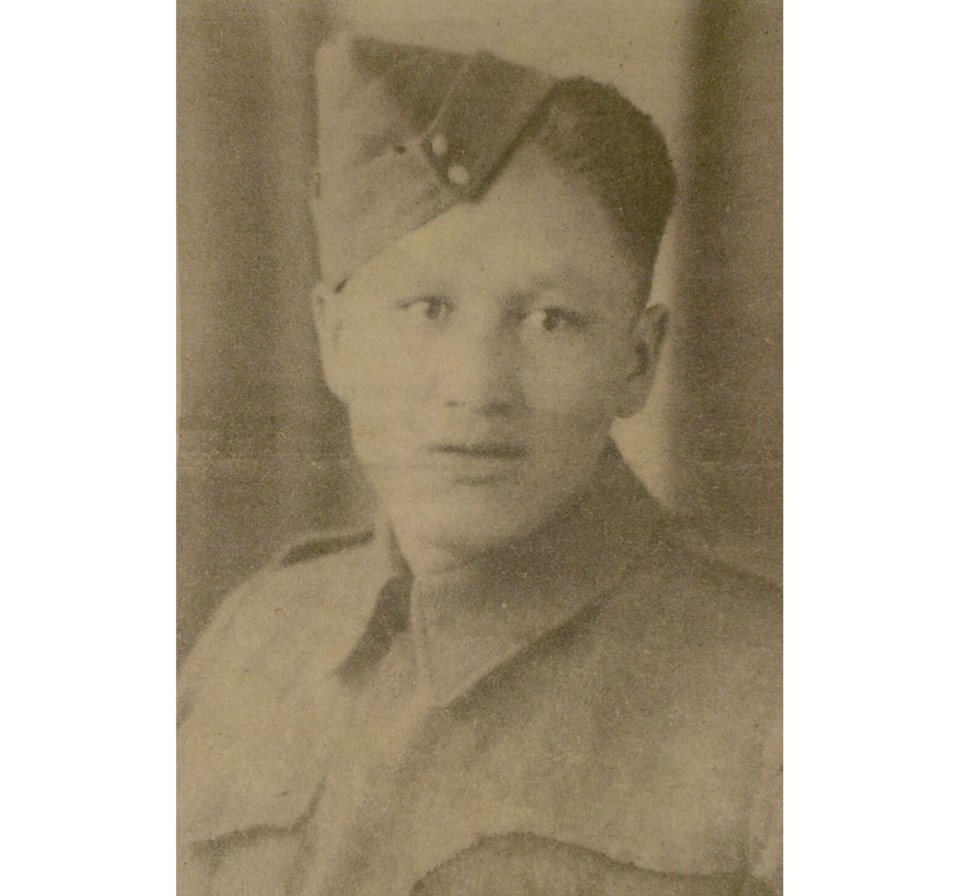The way one war story goes, Dick Patrick lay in the Rhine River for three days, surrounded by German soldiers.
"He took one of those straws you find in water... that you find by the river's edges," recalled his sister Arlene John.
"Our native people knew about this from when you go fishing. He used that and was under water for three days. I guess they thought he passed away and the Germans went on. All these stories he's got... a lot of things he went through."
Born Dominic Patrick of the Saik'uz First Nation, he was known as Dick or "Dicksy" to his comrades and until he died in 1980 at the age of 60 in Vanderhoof.
He was also known as Gunner Patrick, a member of the Fifth Anti-tank Regiment of the Royal Canadian Artillery during the Second World War.
But the story for which Patrick earned his Military Medal and a reputation in his community was for single-handedly forcing the surrender of more than 50 enemy soldiers.
"He snuck in from the back," said John, who was born in 1944 while her brother was at war.
In September that same year, Patrick was part of a 17-pounder M-10 gun crew that helped hold a bridgehead in a Belgian village called Moerbrugge - this according to STIWOT, or the Foundation for Information World War Two in English, a Netherlands-based organization that's documenting the war.
"After the M-10 had shot up several suspected enemy positions, the actual locations of the enemy positions became hard to estimate accurately due to poor visibility and fog," reads the STIWOT website. So Patrick went ahead on foot to find the enemy's position.
The details of what happened next vary from source to source.
"Despite the enemy fire, he succeeded in getting into the middle of an enemy machine gun position and there opened fire with his LMG," STIWOT said.
But according to a 2006 story in Vanderhoof's Omineca Express, Patrick used an "empty machine gun" to capture the soldiers, which included several officers - three by STIWOT's count. John thought she'd heard he had a submachine gun and said Patrick swam to get into position.
These details are closer to how Stellat'en Chief Archie Patrick (no relation) remembers Dick telling his story.
"On a Sunday morning he took a rifle and nothing else because he went into the water... and got in behind the enemy and captured them," said Archie. "By himself."
In this story, Dick had only a few rounds in that rifle, but shot four men on the way to get into position.
"He had one round left in his magazine," when he confronted the 50-plus men.
"They put up their hands, they looked at him. He showed them his hands the number six with his hands and pointed at gun. What he's telling them is I can shoot six of you.
"They looked at him and they were mumbling and he picked a target, at a distance," Archie said.
"He took aim and he shot that target and it fell off.
"Now he had no more but he indicated with his one hand, he spread his hand out: five in my gun. So they all gave up. (It was) towards the end of the war and they didn't want to be shot."
In any case, it is clear Dick was outmanned and outgunned. That act of bravery won him an audience with King George VI.
"He pleaded for (the king) to help his people," said John of how Canada treated its indigenous people. "He mentioned that all the time."
Dick was a survivor of Lejac Residential School, like many other local aboriginal people in the army. According to the band he was one of 15 Saik'uz soldiers: Alex Antoine, Paul Antoine, Duncan George, Edward Ketlo, Alex Paul, Toby Patrick, Frank (Smokey) Quaw, Johnny Antoine, Alex David, Sam George, Finnie Gordon Ketlo, Justa Paul, Isaac Patrick, Jimmie Quaw.
John said her brother, who volunteered in 1939, rarely spoke of the war.
"It's hard for them to talk. I think you'll find that in every veteran you meet," said John, remembering how she would ask her brother about fighting on the front line.
He'd say: "Well, I had to shoot back because it's either me or them."



